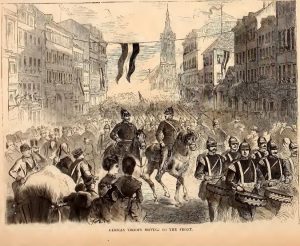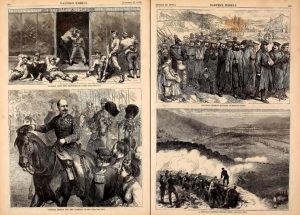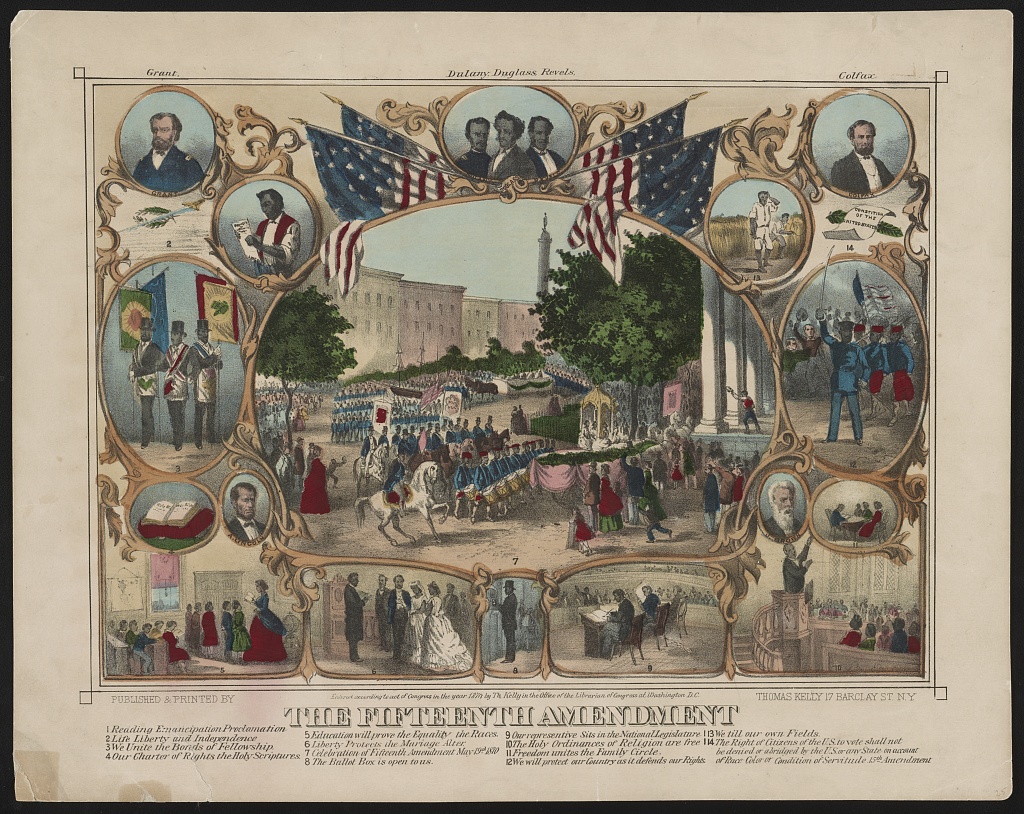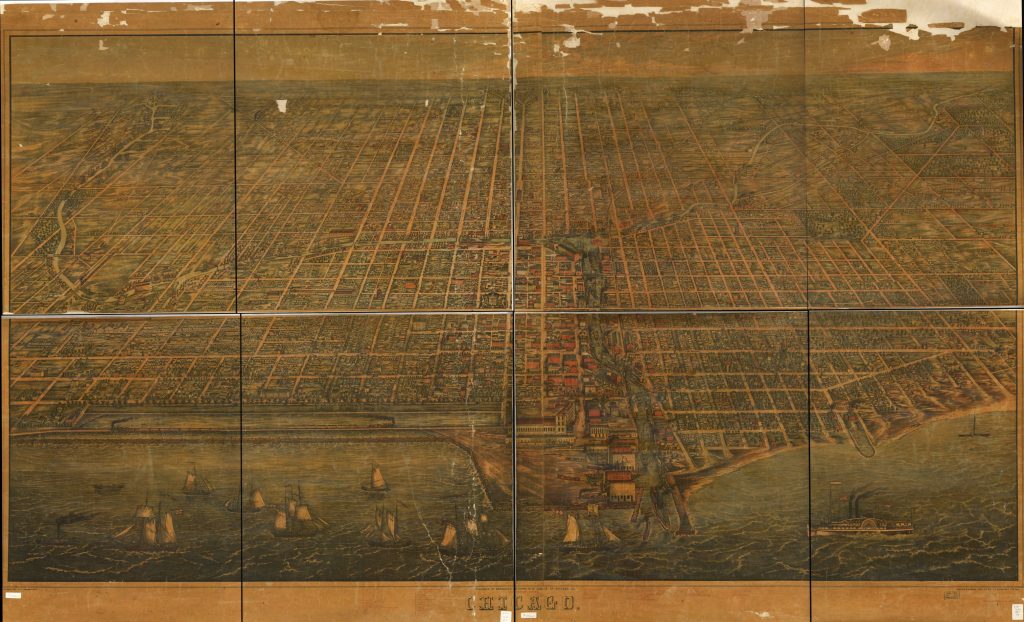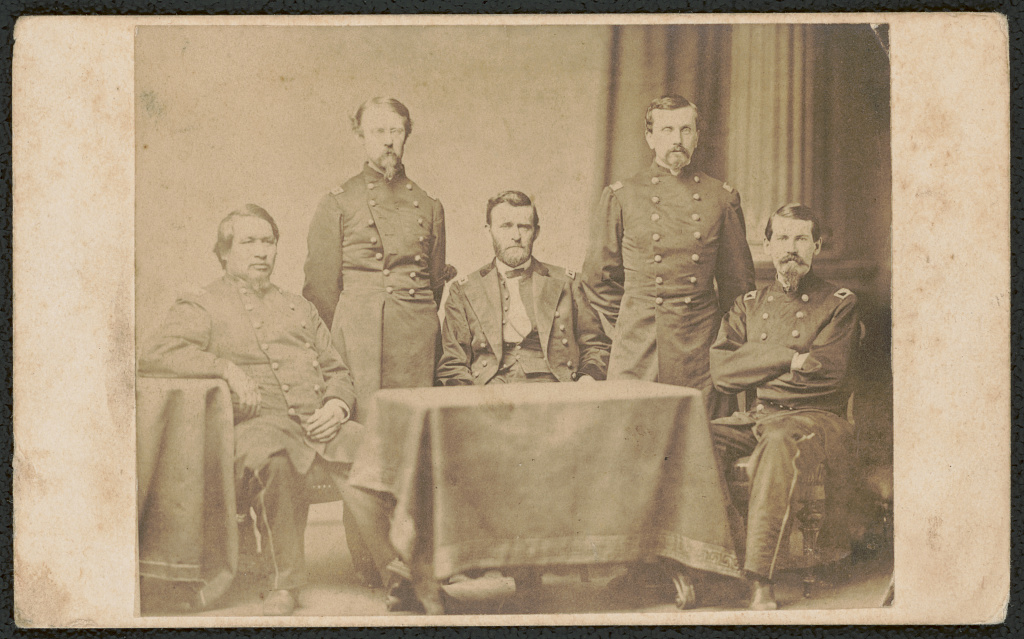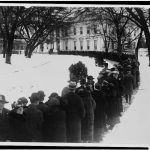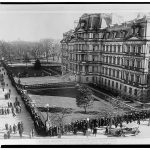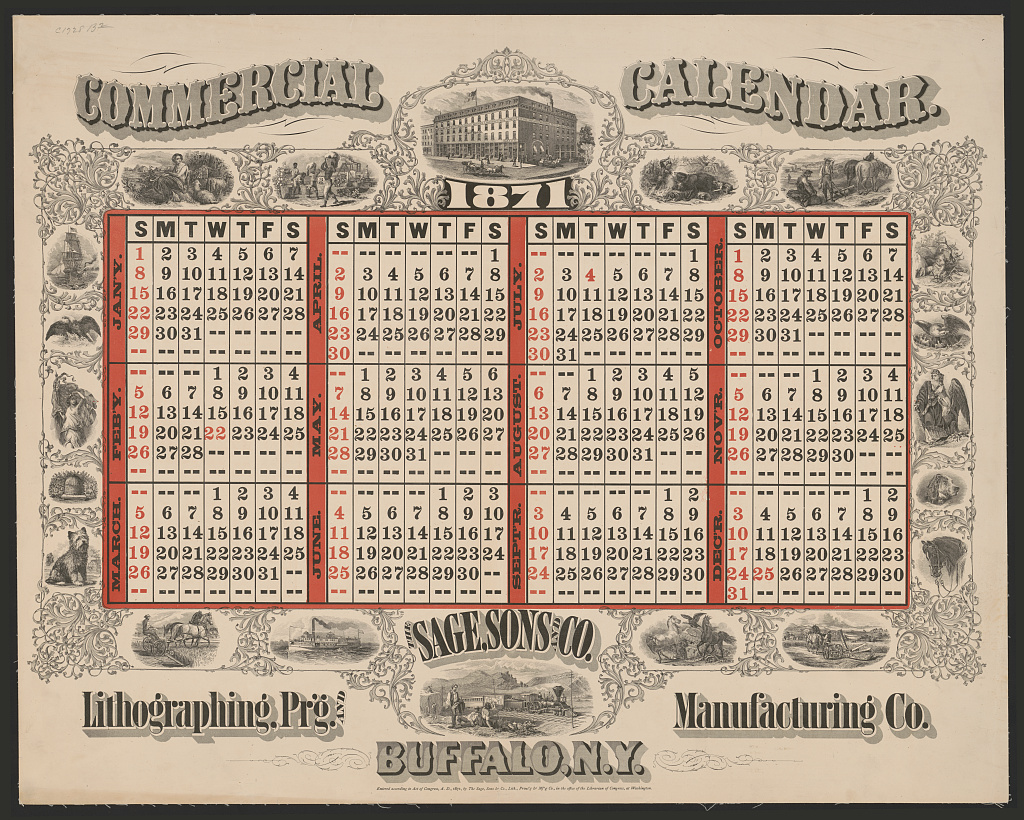At least not over here. The Chicago Tribune used its January 1, 1871 issue to review the old year. According to the paper, the recent-history-perusing side of Janus would have been kind of bored looking at events in the United States:
THE OLD YEAR.
The past year has been, in this country, singularly barren of important events. Some of our social philosophers have laid down, as a law of the social forces, that when some one great convulsion or crime, like war, is putting forth its power, all lesser strifes cease. While our great convulsion was pending, Europe looked on a sympathizing and philosophical spectator; Frenchmen and Prussians wondered at the fierceness of the struggle; the alleged inadequacy of its cause; the supposed pusillanimity which seemed to be displayed by the beligerent [sic] which was taken most unawares at the outset, yet which finally prevailed; and ere long at the bloody and unflinching persistence and slaughter with which it was sustained on both sides. The London Punch, which began by ridiculing our bloodless battles, ended by a cartoon, in which two Europeans, looking across the Atlantic, anxious to know if the war had ended. The observer with the longest glass assured the other that it would not end for some time, as he could still see a few able-bodied men left. So we look on at the Franco-Prussian conflict, around which all the world gathers, aghast and peaceful. How easily could disinterested parties settle their neighbors’ quarrels, and how evident it is that they alone should have the settlement of them. The two first of European nations — each foremost in its advances of science, industry, literature and art — have plunged into mortal strife with as little reason and the same motives as might actuate a street fight between two newsboys, and millions of wealth and hundreds of thousands of lives will be sacrificed, solely because, as Mr. Sumner states it, nations have not yet advanced beyond tho duel as tribunal.
It is yet too early to declare that the apparent downfall of the empire has led to the establishment of a republic in France. … [the other great event in the old year was the adoption of the dogma of papal infallibility during the First Vatican Council. The paper disagreed with the doctrine and referred to Charles Dickens, who passed away in June 1870: While the six hundred priests gathered at Rome were determining whether a clever Bishop of Italy taught infallibly the law of love; the millions themselves turned aside and bowed with grateful tears over tho grave of Charles Dickens, conscious, and yet unconscious, that he had taught them more of the law of law than any Pope in Rome.]
… In our own country it is not too much to say that the most important events have been the adoption of the Fifteenth Amendment and of a new and model constitution by the State of Illinois. The nation is too intent on restoring the industries which were prostrated by the war, reviving our national credit, and the value of our currency, paying off our debt and diminishing our taxation, to have time or interest for sensations. We are passing through our financial “March to the Sea,” a slow, long agony of excessive taxation, straightened economies, general depression, though without actual suffering. In a word, we are realizing all the slow torture of earning and paying our way out of debt. All financial discussions come to this at last, that the only thing to be done with our debts is to earn the money by hard work and pay them off. It is not a pastime. It it a thorny, and aggravating, and excessively hard road to travel. But here again there rises out of the mist [?] of human history an overshadowing and mysterious Presence, declaring, as a sentence of retributive justice, that for every drop of blood wrung, through the years oppression, by the lash, there shall flow another by the sword, and every dollar of wealth gathered from the unpaid toil of the slave shall be offset by an equal sum in the debt incurred for his emancipation. We have paid the penalty in blood. We have still to pay the penalty in treasure. For however it may be with individuals, nations, with unerring fidelity, bear the burden of their own transgressions.
Happily we have now every prospect of lightening our burden rapidly with each year, and of maintaining meanwhile a degree of national prosperity that, on the whole, has not always been exceeded when our load was far less. Every decade adds ten millions of people to our republican empire. Every test has strengthened our republic among earthly powers. Under its protecting shield a more rapid and general progress is being made in wealth, culture, religion, art, and science, than was ever before made by the same number of people. Our own section of the country is participating fully in this marvellous progress. Our own city of Chicago is striding forward –
“To her throne amid the marts,”
with a rapidity unexampled in the history of cities. Republican palaces are rising around us on every street. Edifices, modelled after the residences of the crowned heads of Europe in their order of architecture, are rising on our central streets, and will be devoted to the purposes of commerce, or the wants of travel — thus reasserting, in stone and iron, the essential truth of the sovereignty of the people. Where the people resort, there are our palaces; and none in the world are vaster or more permanent. In all these exhibitions of progress there is not merely the toil of the effort, but the enjoyment of success. Side by side with the temples of trade, and not less costly, are those of art, of song, of worship, and of amusement. These are significant proofs that our enterprise is not sordid, but that our success is human, and that, hand-in-hand with it, go all the amenities, graces, and enjoyments of a true life. Trusting that all these may fall within the experience of our readers, one and all, we tender them gratefully and cordially the wish of the hour — a Happy New Year.
In Columbia, South Carolina The Daily Phoenix used its January 1st editorial to look ahead with a grim determination:
1871 – The New Year.
This morning ushers in a new year. The year 1870 has passed away, with its numerous and diverse incidents, individual and national – with its record, religious, social and political. What is past, we cannot recall. But we are wise, if reviewing the past in the spirit of a sober inquiry, we shall resolve to analyze it truthfully, to study its great lessons and to derive benefit from the review. The year just passed away has been an eventful one for the nations. It has been an eventful one for many an individual. But it is gone – passed away – with its hopes and fears, with its births and deaths, with its disasters and victories. A new year is upon the individual, the nation, the world. It comes with its grave responsibilities. It comes with its great duties. We cannot say that here in South Carolina it comes under very fair auspices. Whilst doubtless we have had cause to be grateful for calamities withheld and blessings received, yet there is much in the political and industrial world in which we live to arouse our anxieties. The skies are not so bright, and our surroundings are not so agreeable as we might desire. But yet, after all, is our duty the same, That duty is obvious. It is to banish all traitorous doubts, and in faith and hope to work on. We have our responsibilities to meet – our responsibilities to God, our country and our families. These must be met and discharged. Let them be met earnestly, hopefully and perseveringly, to the end that they may be discharged efficiently and victoriously. We have victories to win, and God helping, we shall win them – victories over ourselves, by which we shall be made better, wiser and purer – victories over the forces of nature, by which our material progress shall be quickened – victories over the depressing political influences around and over us, by which the State shall be redeemed and re-established.
To those duties we respectfully and earnestly summon our readers. In this spirit of faith, hope and work, we ask them and ourselves to begin the duties of the New Year.
The rather somber theme continued in the nation’s capital. According to the December 31, 1870 edition of The New-York Times, the annual New Year’s reception at the White House was cancelled:
Special Dispatch to the New-York Times.
WASHINGTON, Dec. 30.—In consequence of the death of Mrs. BELKNAP, the programme for the official reception by the President on Monday has been withdrawn. The several Cabinet Ministers have also given notice that there will be no receptions at their respective residences. This will serve to materially check the customary festivities of New-Year’s Day. The action of the President is criticised in some quarters; but as his action is bound to be criticised in any event, a majority of thoughtful people will be glad to see in this a recognition of an event which brings great grief to a member of his official family, and which could not go unrecognized without an imputation of heartlessness and indifference. The funeral of Mrs. BELKNAP will take place on Sunday at 2 o’clock P.M. The pall-bearers selected are Secretary Fish, Secretary Robeson, Gen. Sherman, Gen. Ricketts, Judge Miller, United States Supreme Court; C.P. Marsh, Esq., of New-York; Gen. Horace Porter, Commodore Alden, Gen. Michler and W. S.Huntington, Esq.[1]
Mrs. Belknap would have been the second wife of Secretary of War William W. Belknap – “she died of tuberculosis shortly after childbirth in December 1870.”
According to the White House Historical Society the New Year’s Day reception was an (almost) annual tradition from 1801 to 1932. The site says that there wasn’t a reception the eight years before 1922.
In its January 2, 1871 issue the Richmond Daily Dispatch acknowledged the grimness of events during the last fifteen years (As if the war wasn’t bad enough, on April 27, 1870 a second-floor courtroom collapsed, killing at least 60 people) but believed the bad things had helped Richmond’s citizens develop fortitude and self-reliance. The paper saw a bright future given the city’s natural resources and improving railroad ties.
According to Wikipedia, there was a recession in the United States from June 1869-December 1870. The Chicago Tribune editorial above mentioned the nation’s financial “March to the Sea.” According to Burton W. Folsom at Foundation for Economic Education that march was quite successful:
The starting point here is the decision after the Civil War to reduce the $2.7 billion national debt. From 1866 to 1893, the U.S. government had budget surpluses each year and slashed the national debt to $961 million. Annual revenue during these years was about $350 million and expenses were about $270 million—most of which consisted of Civil War pensions and interest on the national debt.
One reason the federal budgets tended to be lower in the 1880s than in the 1860s and 1870s was that interest payments on the debt declined sharply as the debt disappeared. For example, the annual interest on the national debt dropped from $146 million in 1866 to only $23 million in 1893. The generation that fought the Civil War became the politicians of the Gilded Age, and they had the fortitude to wipe out almost two-thirds of the Civil War debt.
Why couldn’t the government just given everybody $2,000 and be done with it?
Harper’s Weekly provided lots of news about the Franco-Prussian War. You can see and read all of 1870 at the Internet Archive. George N. Barnard’s 1865 photograph of Columbia in ruins comes from the National Archives via Wikimedia – the destruction occurred after General William T. Sherman’s Union army took the city in February 1865.
From the Library of Congress: The Fifteenth amendment; New Year’s Day waiting line from an unknown year; line on January 2, 1922 – like 1871, January 1st fell on Sunday; General William W. Belknap; General Grant and staff – Horace Porter: “From April 4, 1864 to July 25, 1866, Porter was aide-de-camp to General Ulysses S. Grant with the grade of lieutenant colonel in the regular army. On July 17, 1866, President Andrew Johnson nominated Porter for appointment as brevet brigadier general, to rank from March 13, 1866, and the U.S. Senate confirmed the appointment on July 23, 1866. From July 25, 1866 to March 4, 1869, Porter was aide-de-camp to General Ulysses S. Grant with the grade of colonel in the regular army.”; Bird’s-eye-view of Chicago from 1857; commercial calendar
- [1]The New York Times The Complete Front Pages 1851-2008. New York: Black Dog and Leventhal Publishers Inc., 2008. DVD.↩

